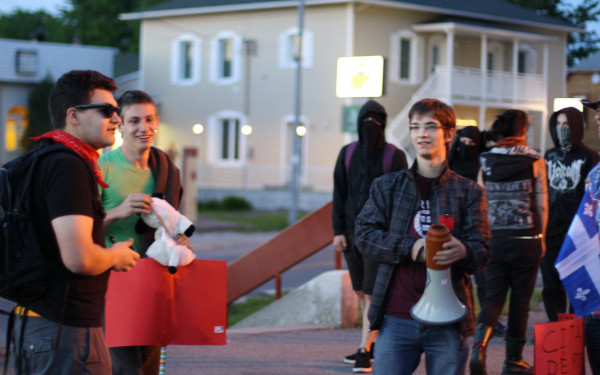Protesters Block Train Tracks in Solidarity with Standing Rock
Pointe-St-Charles Residents Answer Call for Day of Action
Around a dozen people shut down the train tracks in Pointe-St-Charles on Tuesday, as a motion of solidarity with the Indigenous-led struggle against the Dakota Access Pipeline. Approximately 50 more protesters listened to speeches in nearby Parc de la Congregation as the rails were blocked.
The action took place on Nov. 15, which had been called as an international day of action in solidarity with Standing Rock. The callout was made through Indigenous Rising Media by a group of indigenous organizers.
“Hundreds of actions took place worldwide,” mostly concentrated in the United States but reaching as far as Europe, India, and Japan.
Standing Rock has been getting a significant amount of attention over the past months. The movement against the Dakota Access Pipeline began as a small occupation on the Standing Rock Sioux reservation which borders North and South Dakota, and has since expanded into multiple site occupations involving large amounts of people from over 100 tribes as well as settler allies. Direct action regularly shuts down pipeline construction on site.
In Pointe-St-Charles, those who participated in the solidarity action made a phone call to Canadian National railway immediately before taking to the tracks and blocking any rail traffic.
The protesters held the rails for about 20 minutes, stopping a freight train which was carrying a significant amount of oil cars.
The police took down a temporary fence to get on the tracks, and threatened protesters with large fines, leading to the end of the blockade. No arrests were made.
In the park, Clifton Nicholas—an activist from Kanehsatà:ke—read the declaration of solidarity between Pointe-St-Charles and Standing Rock. The declaration refers to Montreal by its Kanien’keha name, which is Tio’tia:ke. Members of the Chaotic Insurrection Ensemble marching band also played songs in between speeches.
Nicholas said that Quebecers, in particular, should understand the danger of the Dakota Access Pipeline.
“The crude oil that they plan on using in that pipeline is Bakken crude,” he said. “That’s the same oil that exploded and burned down half of Lac-Megantic [after a train derailment in 2013]. That’s the same poison they want to pump through North Dakota.”
The police response to Standing Rock, Nicholas continued, is comparable to previous acts of colonial violence against Indigenous peoples, including the 1990 Oka Crisis that he took part in.
“It brings back memories of 1990. It brings back memories of 1973, at Wounded Knee, or even the massacre at Wounded Knee in 1890, or the rounding up of the Apache Nation in the 1800s,” he said. “The images you’re seeing from [Standing Rock] are so reminiscent of those eras. There are so many parallels—so many things that need to be addressed.”
After being evicted from the train tracks, the smaller group of protesters joined the larger group in the park. The entire group then took to the streets, chanting slogans such as “we stand with Standing Rock,” and “water is life.” A heavy police presence, including six police vans and at least the same amount of motorcycles, escorted the approximately 60 protesters.
The march ended, about half an hour after it took the streets, at Charlevoix metro station.
Protests were also held in Kahnawake earlier in the day, bringing over 100 community members out in a show of solidarity with Standing Rock. Members of that community have been camped out at the foot of the Mercier Bridge for weeks as a show of solidarity, periodically shutting down the bridge and blocking the adjacent railroad tracks. On Tuesday night, as the Pointe-St-Charles protest was happening, residents of Kahnawake began an overnight blockade on the railroad tracks.
Clifton Nicholas says he hopes that others will take action and show solidarity with Standing Rock
“It’s not just an Indigenous issue, it’s a human issue,” he said. “I hope that this starts a big shift away from dirty energy, into something that’s more sustainable.”
The US Army Corps. of Engineers, which grants permits to build infrastructure such as pipelines, announced Monday that it was temporarily halting pipeline construction on federally administered land under and around Lake Oahe. Construction on private land was not affected by the decision.




1_600_375_90_s_c1.jpg)

_600_375_90_s_c1.jpg)